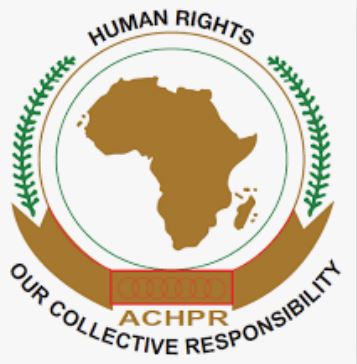The African Commission on Human and People’s Rights (ACHPR): Mission & Challenges

The African Commission on Human and Peoples’ Rights (ACHPR) is an autonomous treaty body of the African Union, and formed by Commissioners under Article 31 of the African Charter, elected by the Assembly of Heads of State and Government of the African Union . ACHPR is tasked with promotion and protection of human rights and collective rights throughout the African continent, interpretation of the African Charter on Human and Peoples’ Rights, and consideration of individual complaints of violations of the Charter.
The African Commission on Human and Peoples’ Rights (ACHPR) is an autonomous treaty body of the African Union, and formed by Commissioners under Article 31 of the African Charter, elected by the Assembly of Heads of State and Government of the African Union . ACHPR is tasked with promotion and protection of human rights and collective rights throughout the African continent, interpretation of the African Charter on Human and Peoples’ Rights, and consideration of individual complaints of violations of the Charter.
The commission has a wide range of promotional, protective, and interpretive responsibilities. The functions of the ACHPR are outlined by the charter as follows:
– Promotion of human and peoples’ rights: The commission collects documents, undertakes studies, and performs research on the issues of human rights. It also organizes seminars and conferences to disseminate information, while encouraging national and local institutions regarding human and people’s rights. The commission also formulates principles ad rules to resolve the legal problems associated with human rights and fundamental freedoms which may form the basis of legislations of African government.
– Cooperation with different African and international institutions to promote and protect human and peoples’ rights while ensuring the protection of such rights,
– Interpretation of all the provisions of the African Charter when requested by State Parties, institutions of the Organization of African Unity (OAU), or African Organizations recognized by the OAU, and
– Performing any other tasks entrusted to it by the Assembly of Heads of States and Government .
Along with the important function of the promotion of human rights, the commission is assigned the principal function of ensuring the protection of human rights under conditions laid down in the African Charter, carried out according to the ‘communication procedure’ as a complaint system through which an individual, NGO, or group of individuals who feel that their right or those of others have been or are being violated, can complain to the Commission about these violations.Following in-depth investigation and examination of the arguments provided by both parties, the Commission decides on the existence of violation, after which recommendations are made to the State and to the OAU Assembly on what should be done and how the victim should be remedied.
The activity reports of the commission provide information on the areas of positive development in the field of human rights in the continent, areas of concern, administrative and financial situation, and implementation of decisions while also making recommendations (47th Activity Report of the ACHPR, 2019). The reports encourage the state parties to ensure that the rights recognized under the charter are fully implemented. Besides, different NGOs are provided with the opportunity of giving independent reports and other critical information to the commissioners through the review of states’ reports carried out in the commission’s open sessions, thereby sharpening their investigation of the human rights in the state under review.
However, in many cases, the reports submitted to the commission are generally incomplete, providing insufficient information for effective review of the states’ human rights conditions. One important point is that although the ACHPR is recognized as the main body that monitors the implementation of the African Charter by States parties, it has not been successful in concrete engagement of the continent’s important human rights problems and address Africa’s pervasive economic, social and cultural (ESC) rights violations. There have been also challenges in developing appropriate jurisprudence on human rights in general and economic, social and cultural rights in particular due to the absence of an efficient procedure for individual complaints.
The failure of many states to report regularly has disrupted processes and jeopardized the performance of ACHPR. In this regard, Amnesty International rated the overall compliance of African countries to their reporting obligations to the ACHPR as dismal. Accordingly, evidence shows that only six countries had submitted periodic reports up to 30 June 2020 with six countries, including Comoros, Equatorial Guinea, Guinea Bissau, Sao Tome and Principe, Somalia and South Sudan never submitting a single report. The rate of responses to urgent appeals on allegations of human rights violations issued by the African Commission has been also low. The outspread of COVID-19 has worsened the conditions, and as stated by the Amnesty International, the pandemic has been managed by many African governments through the use of excessive force, arbitrary arrests or detention, restrictions on civic space, and blanket denial of the right to seek asylum (Reliefweb, 2020).
The workload of the Commission increases gradually every year. In spite of the financial and other constraints facing the Commission, it is an institution capable of responding to the present-day challenges in Africa. However, it needs cooperation of all states, NGOs, human rights advocates, and lawyers.
References
African Union (2021). 68th Ordinary Session of the African Commission on Human & Peoples’ Rights (ACHPR). https://au.int/en/pressreleases/20210504/achpr-68th-ordinary-session-african-commission-human-peoples-rights
47th Activity Report on the African Commission on Human and Peoples’ Rights. (2019), https://www.achpr.org/public/Document/file/English/47th%20Activity%20Report%20%20ENGLISH.pdf
Reliefweb (2020). https://reliefweb.int/report/world/state-african-regional-human-rights-bodies-and-mechanisms-2019-2020
http://hrlibrary.umn.edu/edumat/IHRIP/circle/modules/module28.htm
https://www.achpr.org/

